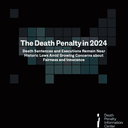Dr. Philip B. Woodhall, M.D., who practiced emergency medicine in North Carolina for many years, recently wrote about the proposed role of doctors in carrying out lethal injections. He stated that medicine and executions do not mix. “[D]octors are given extraordinary rights and privileges,” he wrote, and “these powers are dedicated to the preservation of human life, not to the service of death.” Woodhall urged North Carolina’s Department of Corrections to abandon efforts to include doctors in any aspect of executions. He further commented:
When I think about executions in North Carolina, I think about advice I gave my teenage daughters: Nothing good happens after midnight. Our state executes prisoners at 2 a.m. on Fridays; we choose the same hour as folks who have something to hide. What remains in plain view is the frightful implication of converting execution to a medical procedure.
…
Since 1980 the American Medical Association has had policies in place to discourage doctors from participating in executions. Since 1992 the Code of Medical Ethics, Article 2.06, has specifically forbidden any participation in executions, with the exception of prescribing sedation beforehand and later signing the death certificate. The N.C. Medical Board has formalized a national professional standard that is 15 years old.
…
On April 11, a Department of Corrections official called Aspect Medical Systems in Massachusetts to rush-purchase a special brainwave monitor. The written purchase order request from North Carolina stated, “This equipment is used to monitor vital signs and sedation scales of patients recovering from surgery.” The machine is a technical but imperfect aid to assure that a sedated person is unconscious. Armed with this new monitor, the state received court permission to execute [Willie] Brown on April 21, 2006.
Aspect, appalled at this nonmedical use of its equipment, now requires purchasers to sign a statement declaring that the equipment will not be used as part of a lethal injection execution. As reported in the New England Journal of Medicine, the Department of Correction refused to comment on this incident.
Such behavior by our government buoys the moral and practical arguments against the death penalty. Whether an individual physician supports or decries execution, the Medical Board is right to use its power to prevent all physicians from participating.
Doctors are granted extraordinary rights and privileges, such as surgery — which might otherwise be considered assault — or the prescribing of potentially lethal and addictive medicines. These powers are dedicated to the preservation of human life, not to the service of death.
…
There is a good way to prevent this nightmare from recurring. Wake up. The whole world is watching.
(North Carolina News & Observer, March 13, 2007). See New Voices and Lethal Injection.
News
DOCTOR’S VIEW: “In the Execution Chamber, Medicine is Misplaced”
By Death Penalty Information Center
Posted on Mar 13, 2007 | Updated on Mar 14, 2025
Citation Guide


